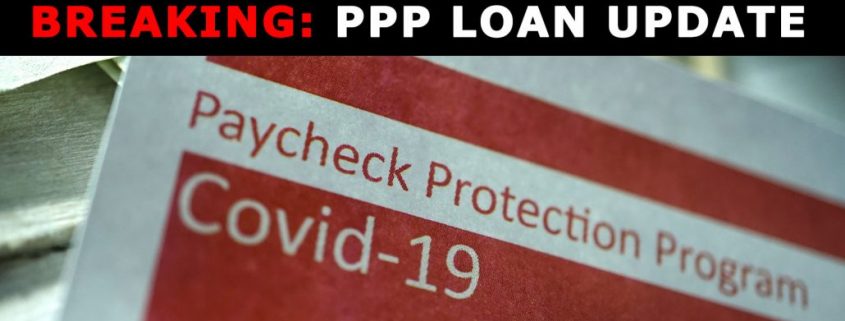More Guidance From IRS On PPP Loans: Deductibility of Expenses Where a Business Received a PPP Loan
More Guidance From IRS On PPP Loans: Deductibility of Expenses Where a Business Received a PPP Loan
On March 27, 2020 President Trump signed the $2 trillion Stimulus Bill formally known as the Coronavirus Aid, Relief and Economic Security [CARES] Act (the “CARES Act”) to provide assistance to workplaces and employees. The CARES Act provides many benefits intended to deliver cash into the hands of individuals and businesses, as well as many other tax provisions. One of the most publicized provisions is the access of funds through banks to qualifying businesses and self-employed taxpayers to pay for payroll, insurance premiums and mortgage, rent and utility payments. This is known as the Paycheck Protection Program (“PPP”).
Under this program administered by the U.S. Treasury and the U.S. Small Business Administration (SBA), small businesses with 500 or fewer employees including not-for-profits, veterans’ organizations, tribal concerns, self-employed individuals, sole proprietorships, and independent contractors are eligible for loans to pay up to eight weeks of payroll costs including benefits as well as other costs.
Eligible loan recipients are eligible for forgiveness of indebtedness for all or a portion of the stated principal amount of a covered PPP loan if certain conditions are satisfied, and the forgiven amount is excluded from the borrower’s gross income.
How To Report Forgiven PPP Loans?
IRC §6050P generally requires a lender that discharges at least $600 of a borrower’s indebtedness to file a Form 1099-C, Cancellation of Debt, with the IRS and to furnish a payee statement to the borrower. Concerned that the filing of such information returns could result in the issuance of under-reporter notices (IRS Letter CP2000) to eligible recipients, on September 22, 2020, the IRS announced that lenders in the PPP should not file cancellation-of-debt information returns or furnish payee statements under IRC §6050P to report the amount of qualifying forgiveness with respect to covered loans made under PPP.
Can You Deduct Expenses Paid With PPP Loan Proceeds That Are Forgiven?
On November 18, 2020, the IRS announced that since businesses are not taxed on the proceeds of a forgiven PPP loan, the expenses are not deductible. Now it is interesting to note that the CARES Act did not specifically address whether the expenses used to achieve the loan forgiveness would continue to be deductible. The IRS came up with this announcement on the basis laid out in Revenue Ruling 83-3 which states that where tax-exempt income is earmarked for a specific purpose, and deductions are incurred in carrying out that purpose, IRC §265(a) applies in disallowing the deductibility of those expenses because such deductions are allocable to the tax-exempt income.
What can PPP funds be used to pay?
PPP funds can be used to pay payroll costs including benefits (with salaries being under $100,000 per employee), interest on mortgages, rent payments, and utility bills; however, no more than 40% of the funds can be used for non-payroll costs.
What counts as payroll costs?
- Salary, wages, commissions, or tips (capped at $100,000 on an annualized basisfor each employee);
- Employee benefits including costs for vacation, parental, family, medical, or sick leave; allowance for separation or dismissal; payments required for the provisions of group health care benefits including insurance premiums; and payment of any retirement benefit;
- State and local taxes assessed on compensation; and
- For a sole proprietor or independent contractor: wages, commissions, income, or net earnings from self-employment, capped at $100,000 on an annualized basisfor each employee.
What counts as non-payroll costs?
- Intereston mortgage obligations, incurred before February 15, 2020;
- Rent, under lease agreements in force before February 15, 2020; and
- Utilities, for which service began before February 15, 2020.
Under what circumstances do I have to repay these PPP funds received?
The loan of the PPP funds will be forgiven if you maintain your pre-existing employees at their pre-existing salary levels. Also, that you do not pay out more than 40% of the PPP funds for non-payroll costs specifically limited to: interest on mortgages, rent, and utilities.
What if I do not spend all the funds or make non-qualifying expenditures?
The amount of loan forgiveness will be reduced including if full-time headcount declines or if salaries and wages decrease. Also, if you use the loan amount for anything other than payroll costs, mortgage interest, rent, and utilities payments over the 24 weeks after getting the loan.
How can I request loan forgiveness?
You can submit a request to the lender that is servicing the loan by completing the SBA application. The request will include documents that verify the number of full-time equivalent employees and pay rates, as well as the payments on eligible mortgage, lease, and utility obligations. You must certify that the documents are true and that you used the forgiveness amount to keep employees and make eligible mortgage interest, rent, and utility payments. The lender must make a decision on the forgiveness within 60 days.
What Should You Do?
Your year-end tax planning should consider if your PPP loan will be forgiven in the future as the loan forgiveness is tied to deductibility of the expenses which impact how much tax a business could owe. Let the attorneys at the Law Offices Of Jeffrey B. Kahn, P.C. located in Orange County (Irvine), Los Angeles (including Long Beach and Ontario) and elsewhere in California assist you maximizing your tax deductions. Also if you are involved in cannabis, check out what a cannabis tax attorney can do for you. And if you are involved in crypto currency, check out what a bitcoin tax attorney can do for you.


 Follow
Follow Follow
Follow
